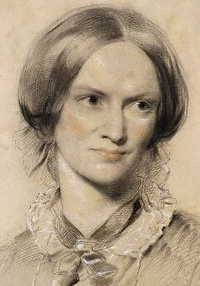
Charlotte Brontë was an English novelist and poet, the eldest of the three Brontë sisters who survived into adulthood and whose novels became classics of English literature. She is best known for her novel Jane Eyre, which she published under the gender neutral pen name Currer Bell. Jane Eyre went on to become a success in publication, and is widely held in high regard in the gothic fiction genre of literature.
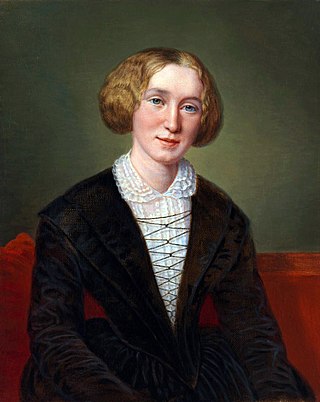
Mary Ann Evans, known by her pen name George Eliot, was an English novelist, poet, journalist, translator, and one of the leading writers of the Victorian era. She wrote seven novels: Adam Bede (1859), The Mill on the Floss (1860), Silas Marner (1861), Romola (1862–1863), Felix Holt, the Radical (1866), Middlemarch (1871–1872) and Daniel Deronda (1876). Like Charles Dickens and Thomas Hardy, she emerged from provincial England; most of her works are set there. Her works are known for their realism, psychological insight, sense of place and detailed depiction of the countryside.
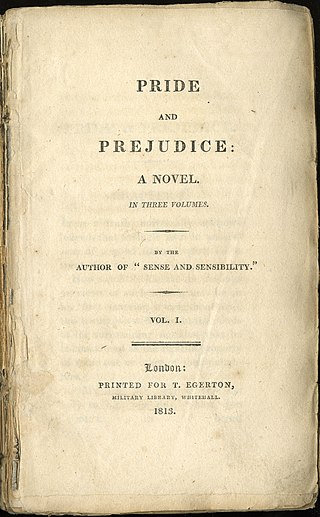
Pride and Prejudice is an 1813 novel of manners by English author Jane Austen. The novel follows the character development of Elizabeth Bennet, the protagonist of the book, who learns about the repercussions of hasty judgments and comes to appreciate the difference between superficial goodness and actual goodness.
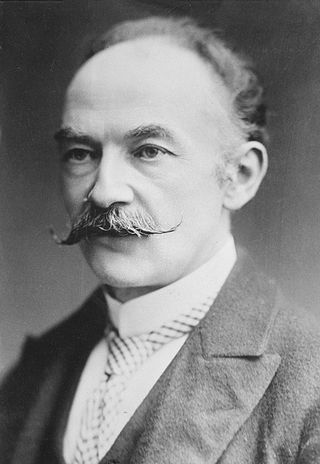
Thomas Hardy was an English novelist and poet. A Victorian realist in the tradition of George Eliot, he was influenced both in his novels and in his poetry by Romanticism, including the poetry of William Wordsworth. He was highly critical of much in Victorian society, especially on the declining status of rural people in Britain, such as those from his native South West England.

The Tale of Genji, also known as Genji Monogatari is a classic work of Japanese literature written in the early 11th century by the noblewoman, poet, and lady-in-waiting Murasaki Shikibu. The original manuscript, created around the peak of the Heian period, no longer exists. It was made in "concertina" or orihon style: several sheets of paper pasted together and folded alternately in one direction then the other.

Jude the Obscure is a novel by Thomas Hardy, which began as a magazine serial in December 1894 and was first published in book form in 1895. It is Hardy's last completed novel. The protagonist, Jude Fawley, is a working-class young man; he is a stonemason who dreams of becoming a scholar. The other main character is his cousin, Sue Bridehead, who is also his central love interest. The novel is concerned in particular with issues of class, education, religion, morality and marriage.
This article contains information about the literary events and publications of 1888.

George Meredith was an English novelist and poet of the Victorian era. At first, his focus was poetry, influenced by John Keats among others, but Meredith gradually established a reputation as a novelist. The Ordeal of Richard Feverel (1859) briefly scandalised Victorian literary circles. Of his later novels, the most enduring is The Egoist (1879), though in his lifetime his greatest success was Diana of the Crossways (1885). His novels were innovative in their attention to characters' psychology, and also took a close interest in social change. His style, in both poetry and prose, was noted for its syntactic complexity; Oscar Wilde likened it to "chaos illumined by brilliant flashes of lightning". Meredith was an encourager of other novelists, as well as an influence on them; among those to benefit were Robert Louis Stevenson and George Gissing. Meredith was nominated for the Nobel Prize in Literature seven times.
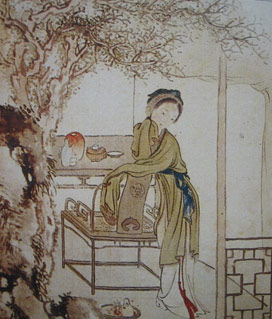
Dream of the Red Chamber or The Story of the Stone is a Chinese novel composed by Cao Xueqin in the mid-18th century. One of the Four Great Classical Novels of Chinese literature, it is known for its psychological scope, and its observation of the worldview, aesthetics, lifestyles, and social relations of 18th-century China.
The History of Cardenio, often referred to as simply Cardenio, is a lost play, known to have been performed by the King's Men, a London theatre company, in 1613. The play is attributed to William Shakespeare and John Fletcher in a Stationers' Register entry of 1653. The content of the play is not known, but it was likely to have been based on an episode in Miguel de Cervantes's Don Quixote involving the character Cardenio, a young man who has been driven mad and lives in the Sierra Morena. Thomas Shelton's translation of the First Part of Don Quixote was published in 1612 and would thus have been available to the presumed authors of the play.
The Red Book of Westmarch is a fictional manuscript written by hobbits, related to the author J. R. R. Tolkien's frame stories. It is an instance of the found manuscript conceit, a literary device to explain the source of his legendarium. In the fiction, it is a collection of writings in which the events of The Hobbit and The Lord of the Rings were recounted by their characters, and from which Tolkien supposedly derived these and other works. The name of the book comes from its red leather binding and casing, and from its having been housed in the Westmarch, a region of Middle-earth next to the Shire.
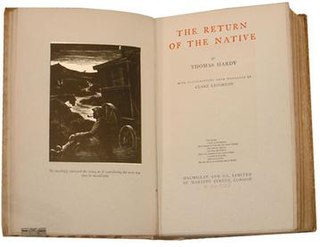
The Return of the Native is Thomas Hardy's sixth published novel. It first appeared in the magazine Belgravia, a publication known for its sensationalism, and was presented in twelve monthly installments from 9 January to 19 December 1878. Because of the novel's controversial themes, Hardy had some difficulty finding a publisher; reviews, however, though somewhat mixed, were generally positive. In the twentieth century, The Return of the Native became one of Hardy's most popular and highly regarded novels.

The Woodlanders is a novel by Thomas Hardy. It was serialised from 15 May 1886 to 9 April 1887 in Macmillan's Magazine and published in three volumes in 1887. It is one of his series of Wessex novels.
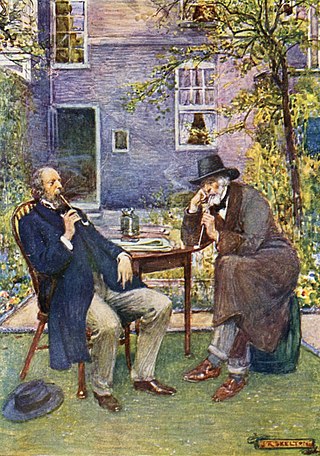
Victorian literature is English literature during the reign of Queen Victoria (1837–1901). The 19th century is considered by some to be the Golden Age of English Literature, especially for British novels. It was in the Victorian era that the novel became the leading literary genre in English. English writing from this era reflects the major transformations in most aspects of English life, from scientific, economic, and technological advances to changes in class structures and the role of religion in society. The number of new novels published each year increased from 100 at the start of the period to 1000 by the end of it. Famous novelists from this period include Charles Dickens, William Makepeace Thackeray, the three Brontë sisters, Elizabeth Gaskell, George Eliot, Thomas Hardy, and Rudyard Kipling.
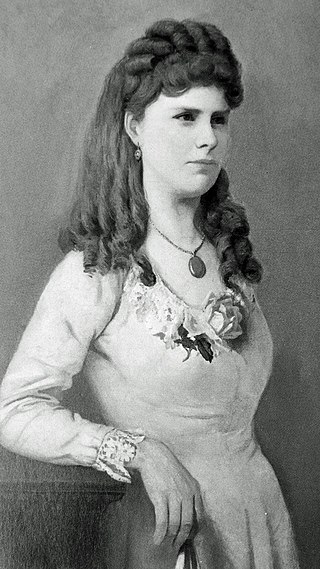
Emma Lavinia Gifford was an English writer and suffragist, who was the first wife of the novelist and poet Thomas Hardy.
"The Battle of Sherramuir" is a song written by the Scottish poet Robert Burns about the Battle of Sheriffmuir which occurred in Scotland in 1715 at the height of the Jacobite rising in England and Scotland. It was written when Burns toured the Highlands in 1787 and first published in The Scots Musical Museum, 1790. It was written to be sung to the 'Cameronian Rant'.
English literature is literature written in the English language from the United Kingdom, its Crown Dependencies and Overseas Territories, the Republic of Ireland, the United States, and the countries of the former British Empire. The English language has developed over the course of more than 1,400 years. The earliest forms of English, a set of Anglo-Frisian dialects brought to Great Britain by Anglo-Saxon invaders in the fifth century, are called Old English. Beowulf is the most famous work in Old English, and has achieved national epic status in England, despite being set in Scandinavia. However, following the Norman conquest of England in 1066, the written form of the Anglo-Saxon language became less common. Under the influence of the new aristocracy, French became the standard language of courts, parliament, and polite society. The English spoken after the Normans came is known as Middle English. This form of English lasted until the 1470s, when the Chancery Standard, a London-based form of English, became widespread. Geoffrey Chaucer (1343–1400), author of The Canterbury Tales, was a significant figure in the development of the legitimacy of vernacular Middle English at a time when the dominant literary languages in England were still French and Latin. The invention of the printing press by Johannes Gutenberg in 1439 also helped to standardise the language, as did the King James Bible (1611), and the Great Vowel Shift.
Helen Craik was a Scottish poet and novelist, and a correspondent of Robert Burns. She praised him for being a "native genius, gay, unique and strong" in an introductory poem to his Glenriddell Manuscripts.











